|
In This Issue...
- Outgoing President's Message
- Incoming President's Message
- 2018 Honors of the Academy
- 2018 Annual Meeting Recap
- ANCDS Student Fellow Program
- ASHA Announcements
- In Memoriam: Arnold E. Aronson
- Member Accomplishments
ANCDS Board Certification
Why become Board Certified?
- Recognizes your advanced clinical knowledge and skills
- Enhances your confidence in your clinical knowledge and skills
- Enhances consumer and referral source confidence in the care you can provide
- Encourages professional growth through the continuing education required for maintenance of board certification
- Provides a respected credential to support professional advancement
Click here to learn more about the application and certification process.
Upcoming Conferences
Mar. 20-23, 2019: Neural Engineering Conference (San Francisco, CA)
May. 28-Jun. 1, 2019: 49th Annual Clinical Aphasiology Conference (Whitefish, MT) - Call for Papers
Jun. 10-11, 2019: 3rd International Conference on Cognitive Stimulation Therapy (St. Louis, Missouri)
New Public Podcasts
Ep. 13: A Conversation w/ Ramani Voleti - A Personal Experience w/ Board Certification and Aspects of Clinical Practice
Ep. 14: A Conversation with Heather Clark - Diagnosing and Treating Motor Speech Disorders and Clinical Training
Listen to all ANCDS podcasts here!
New On Demand CE Offerings
Sep. 2018: Return to Work and Workplace Interventions for Persons with TBI
Dec. 2018: Collaborative Intervention Planning for People with Aphasia and Their Speech-Language Pathologists
View all On Demand CE here!
ANCDS Job Board
Looking for a new career opportunity? Check out our free job board!
Members, want to post a free ad for an open position at your company? Submit this form!
Welcome new members!
Full Members
Nannette Crawford, MA, CCC-SLP
Joan Cumpit, MSEd, CCC-SLP
Denise Davis
Lisa Dubitsky, MS, CCC-SLP
Maureen Hagan, CCC-SLP
Deborah Lanza, MS, CCC-SLP
Mili Mathew, PhD
Jean McCarthy, MS, CCC-SLP
Erin O'Neil, MS, CCC-SLP
Don Robin, PhD, CCC-SLP
Raneh Saadi, MS, CCC-SLP
Lauryn Zipse, PhD, CCC-SLP
Rachel Zuckman, MA
Students
Lisa Bunker, MS, CCC-SLP
Sybrey Callwood
Laura Cannon
Natalie Covington
Sarah Diehl, MS, CF-SLP
Haley Dresang
Nancy Ikehara
Shalom Kim, MS, CF-SLP
Kristin Y. Ladd
Marion Leaman
Barnali Mazumdar
Matthew McFarland, MS, CF-SLP
Alyssa Rickels
Aaron J. Rothbart, CCC-SLP
Sarah Sharitt
Katerina Tetzloff
Victoria Tilton-Bolowsky, MS, CCC-SLP
Kathy Velasco
Madeline Murphy Wollersheim
ANCDS Board/Officers
Linda Shuster, PhD, CCC-SLP
President
Kathleen Youse, PhD, CCC-SLP, BC-ANCDS
President-Elect
JoAnn Silkes, PhD
Secretary
Yvonne Rogalski, PhD, CCC-SLP
Treasurer
Julie Wambaugh, PhD
Immediate Past President
Alaina Davis, PhD, CCC-SLP
Executive Board Member
Gerasimos Fergadiotis, PhD, CCC-SLP
Executive Board Member
Tepanta Fossett, PhD
Executive Board Member
Katy O'Brien, PhD, CCC-SLP
Executive Board Member
Stacie Raymer, PhD
ANCDS Archivist
Sheryle Hazard, CAE
Executive Director
Contact Us
ANCDS
2345 Rice Street, Suite 220
St. Paul, MN 55113
Online: www.ancds.org
Email: [email protected]
Phone: 651-925-5528
Fax: 651-317-8048
Have feedback or suggestions for the newsletter? Contact us here!
|
Outgoing President's Message
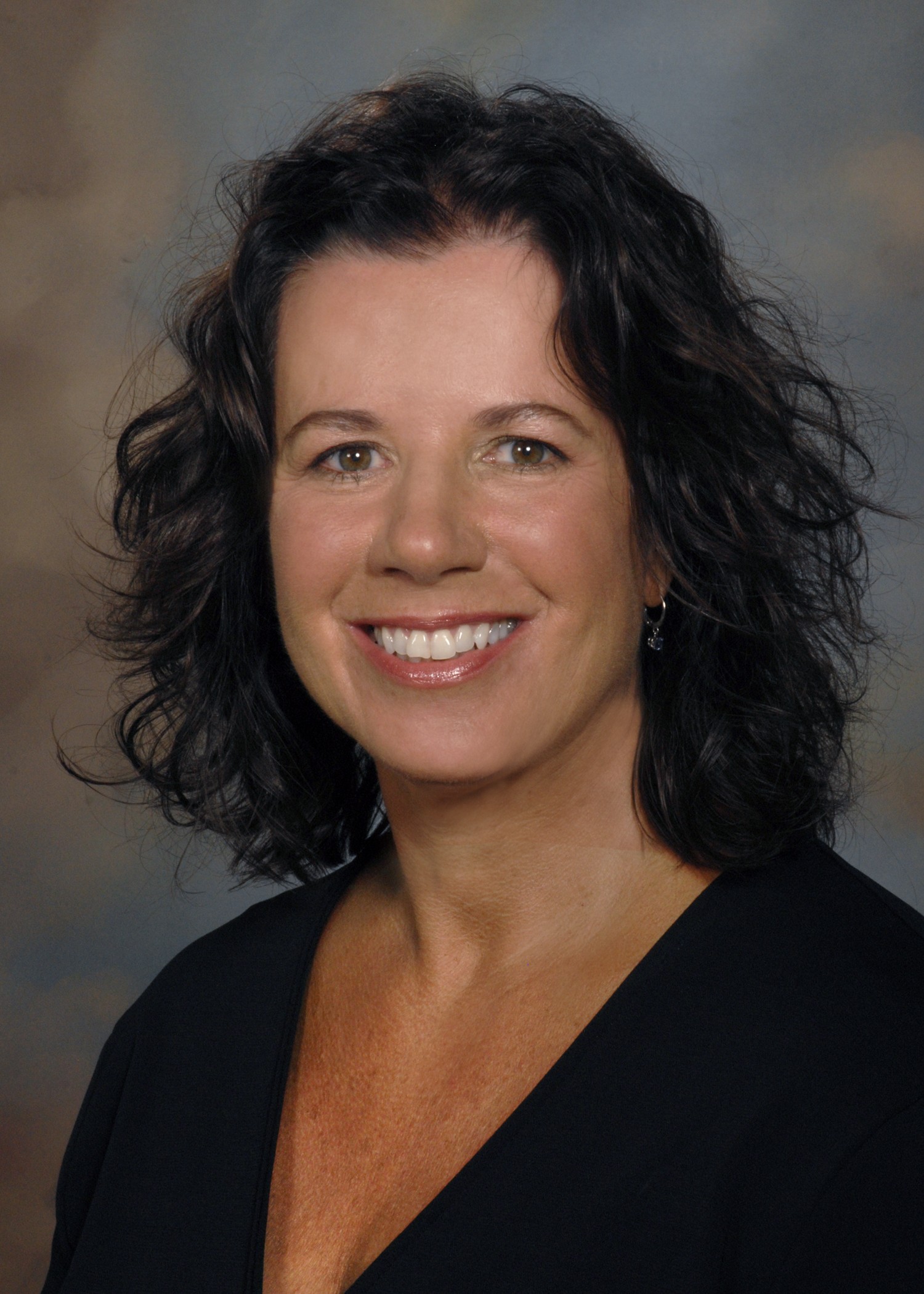 As we begin our new year, I want to express my heartfelt gratitude for the opportunity to have served as president of ANCDS. It has been my honor to work on behalf of our organization and my pleasure to serve along with our many volunteers. As we begin our new year, I want to express my heartfelt gratitude for the opportunity to have served as president of ANCDS. It has been my honor to work on behalf of our organization and my pleasure to serve along with our many volunteers.
I would like to thank our dedicated Committee Members and Board Members for their extraordinary efforts which allowed ANCDS to have a very successful year. Some of the highlights of an exceptionally productive 2018 include the following:
- Offered more "live" and "on-demand" continuing education opportunities
- Increased student fellowships and fellowship activities
- Expanded communications to members and related professional organizations (RPOs); ANCDS is now partnering with more than 25 RPOs
- Initiated a mentoring program for board certification applicants
- Increased social media presence and newsletter publications
- Continued, cutting-edge, evidence-based clinical research activities, including publication of "Reading comprehension treatment in aphasia: A systematic review"
- Recruited our first scientific meeting sponsor, SIMUCASE
- Created an ad hoc committee to address the feasibility of ANCDS developing and managing a residency program in coordination with the Department of Veterans Affairs
- Completed a review and procedural update concerning ANCDS finances
I would also like to extend my sincere thanks to all of our student fellowship donors and appreciation to our dedicated management team, Association Development Services.
2019 offers some exciting opportunities to increase our impact in the management of neurologic communication disorders. I look forward to working with our 2019 ANCDS President, Dr. Linda Shuster, and our new and continuing volunteers in furthering the work of ANCDS.
Best wishes to all of you for a wonderful new year.
Sincerely,
Julie Wambaugh, Ph.D.
ANCDS Immediate Past President
Incoming President's Message
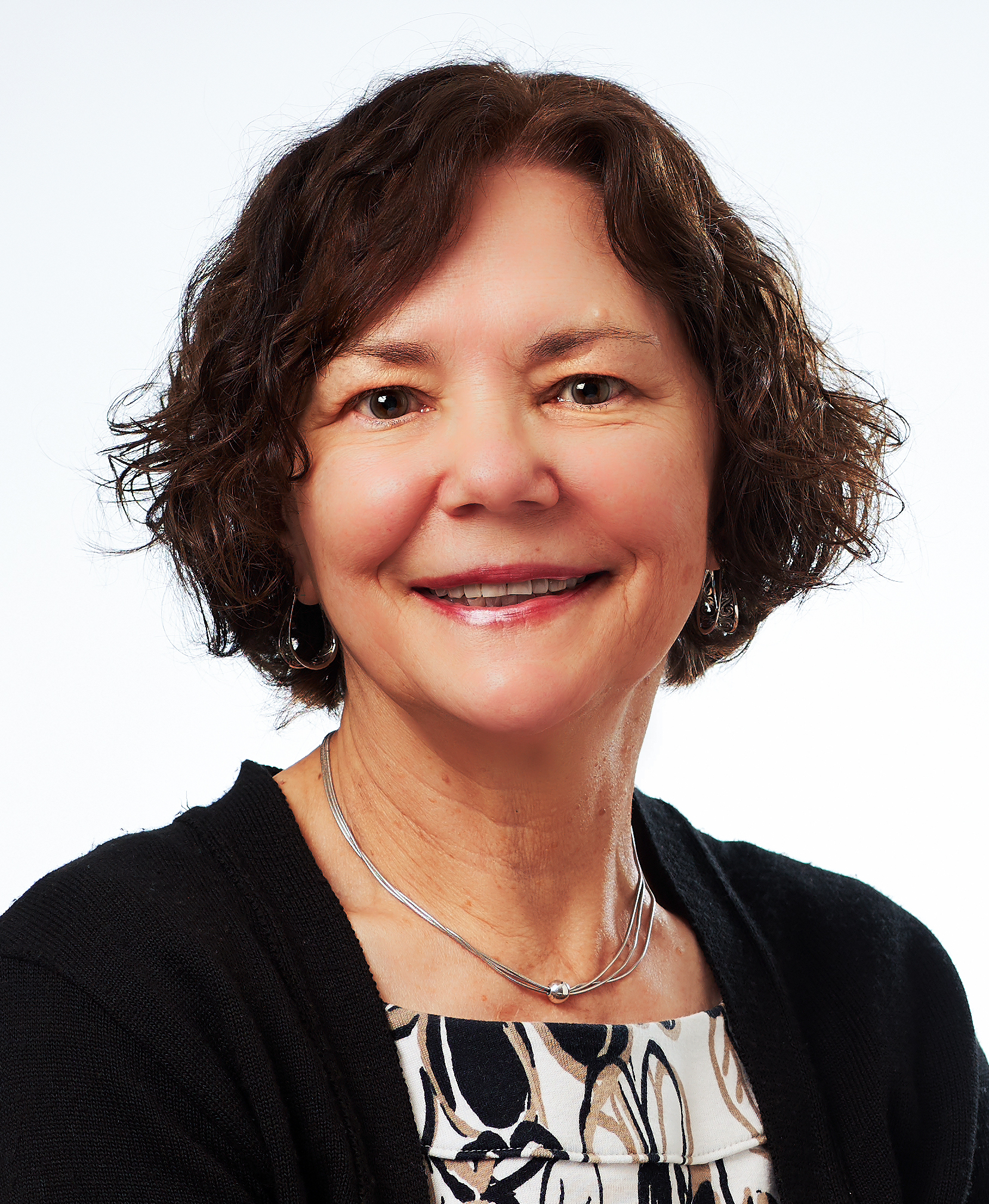 As I assume the Presidency of ANCDS, I am grateful for the hard work of my predecessor, Julie Wambaugh. Among her many accomplishments was continuing and expanding the legacy of Richard Peach in ensuring that our finances are in sound condition. As I assume the Presidency of ANCDS, I am grateful for the hard work of my predecessor, Julie Wambaugh. Among her many accomplishments was continuing and expanding the legacy of Richard Peach in ensuring that our finances are in sound condition.
I am also grateful for the hard work of the Executive Board and the members of our volunteer committees. They have been extremely generous in the donation of their time and their creativity to help meet our mission of improving the lives of people with neurogenic communication disorders. I look forward to continuing to work with them.
Finally, I am grateful to our members, who have the vision and commitment to support our mission with their participation in ANCDS activities, their membership dues, and their contributions to our Student Fellowship Program.
I was very pleased with the response when I announced at the 2018 Annual Meeting that the initiative for my Presidency is to focus on the implementation of evidence-based research into clinical practice. I received a number of excellent suggestions for addressing this initiative.
I am assuming the Presidency at an exciting time in the history of ANCDS, and I am looking forward to serving as your President. I encourage you to contact me if you have suggestions, concerns, questions, or any other issues.
Sincerely,
Linda Shuster, Ph.D., CCC-SLP
2019 ANCDS President
2018 Honors of the Academy
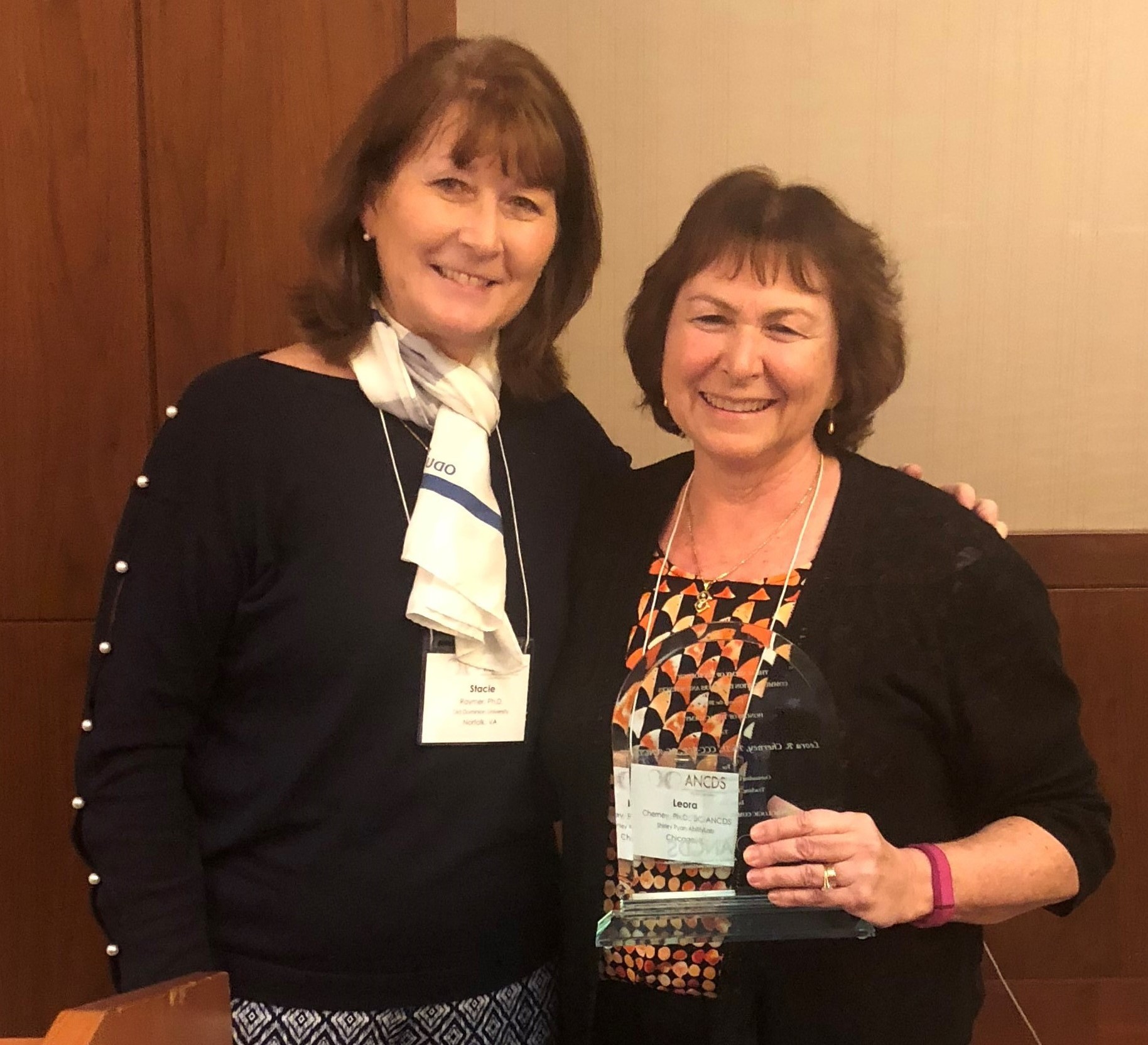 ANCDS Honors Committee Chair, Stacie Raymer, PhD (left), presents the Honors of the Academy award to Leora Cherney, PhD, BC-ANCDS, at the 2018 ANCDS Annual Meeting in Boston, MA. ANCDS Honors Committee Chair, Stacie Raymer, PhD (left), presents the Honors of the Academy award to Leora Cherney, PhD, BC-ANCDS, at the 2018 ANCDS Annual Meeting in Boston, MA.
ANCDS recognized Leora Cherney, Ph.D., Scientific Chair and Coleman Foundation Chair at the Shirley Ryan AbilityLab, Chicago, IL (formerly Rehabilitation Institute of Chicago), and Professor at Northwestern University, as the recipient of the 2018 ANCDS Honors of the Academy award. She received the award at a ceremony during the ANCDS Annual Scientific and Business Meeting in Boston, MA, on November 14. The Honors of the ANCDS, the highest honor of the Academy, recognizes ANCDS members who have made outstanding contributions to research, teaching, treatment, and/or service in the area of neurologic communication disorders. (Continue reading)
2018 Annual Meeting Recap
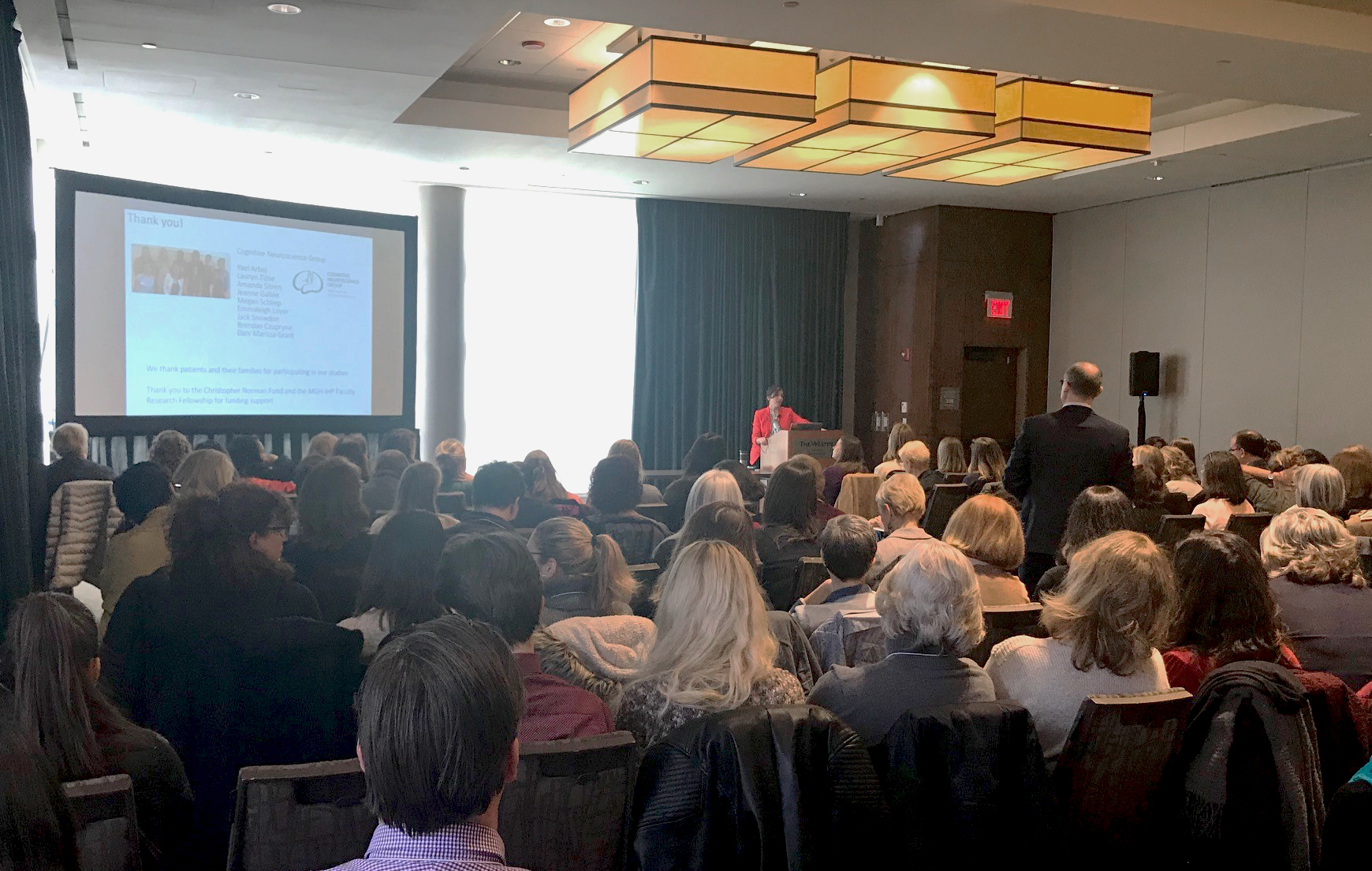
The 2018 ANCDS Annual Scientific Meeting was our best-attended meeting ever! With over 150 attendees, we had an outstanding day of learning in Boston. This year's theme was Advances in Neurological Rehabilitation, and our speakers addressed a wide range of exciting new ideas and tools that are both currently available and under development.
The morning sessions addressed issues surrounding aphasia recovery. First, Dr. Swathi Kiran of Boston University addressed the topic of functional reorganization of the language system in aphasia, with an eye toward predicting recovery prognosis and trajectory for individuals. She presented a theory of recovery in chronic aphasia that merges the influence of an individual's neurological profile with their language / cognitive and social / functional profile to allow accurate prediction. In addition, she reported on data being collected from users of Constant Therapy aphasia treatment apps. Data from nearly 80 million exercises completed are confirming that people with milder impairments make more improvement, and that more treatment trials are needed for individuals with more severe impairments to make the same degree of improvement as those who are less impaired. This is consistent with both common wisdom and smaller studies in aphasia rehabilitation, but confirmation from such a large data set is novel and exciting. (Continue reading)
Thank you to all who joined us at this exciting event! We hope you enjoyed the opportunity to connect with colleagues, get an update on your professional association, and learn from our wonderfully informative speakers. For more exclusive photos from the conference, visit us on Facebook. We look forward to seeing you in 2019!
2018 Annual Meeting Silver Sponsor

ANCDS does not endorse specific companies or products.
ANCDS Student Fellow Program

ANCDS was pleased to offer fellowship awards to 12 outstanding students to attend the 2018 Scientific and Business Meeting in Boston, MA. Start-up funds for the original awards offered in 2011 were contributed by Dr. Lawrence Shriberg, keynote speaker for the 2010 ANCDS Annual Conference, who donated his honorarium back to the ANCDS. Funds to sustain the program continue to be provided by the ANCDS Executive Board.
Click here for the full list of current student fellows and their conference mentors.
Several of the new fellows recently spoke with ANCDS to discuss why they decided to participate in the Student Fellow program. Click below to read their full interviews:
- Natalie V. Covington, M.A. CCC-SLP, Doctoral Student at Vanderbilt University
- Anya Leyhe, Master's Student at University of Montana
- Alyssa Rickels, Master's Student at Minnesota State University, Mankato
- Megan Schliep, MA, CCC-SLP, MPH, Doctoral Student at MGH Institute of Health Professions
- Madeline Wollersheim, Master's Student at University of Arizona
We would also like to extend a huge thank you to the mentors who volunteered to support these students at our Annual Meeting and beyond! Your encouragement and expertise play such an important role in the lives and careers of our Student Fellows! Click here to read a brief Q+A with Dr. Ellyn Riley about her experience as a conference mentor to fellow Haley Dresang.
Interested in becoming a Fellow or a Mentor? Stay tuned to our website and your inbox for more information on the 2019 program, coming soon!
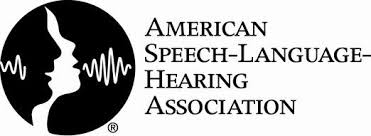
ASHA Announcements
Resources for Practice
Practice Portal: Find information on clinical topics and professional issues to help translate evidence and expert opinion into practice. Newly released topics: Early intervention, Orofacial Multifunctional Disorders, and more! Check it out at http://www.asha.org/practice-portal/.
Interprofessional Education/Interprofessional Practice (IPE/IPP)
- *NEW!* ASHA's 2019 Stipend Program for IPEC's Interprofessional Faculty Development Institutes
- Promote IPE/IPP With Public Service Announcements
- Check out ASHA's resources
Learn more about decisional capacity in individuals with neurogenic speech and language impairments *SIG 2 (Neurogenic Communication Disorders) Perspectives article*
Research & Mentoring Opportunities
Clinicians and Researchers Collaborating (CLARC): The CLARC program is an online tool designed to enable clinicians and researchers to identify each other for the purpose of forming research collaborations. Find out more at http://www.asha.org/academic/CLARC/.
Mentoring Academic Research Careers (MARC): An online mentoring program that supports CSD junior faculty, post-doctoral fellows and PhD students in achieving and sustaining a rewarding career in academia through one-on-one online mentoring by seasoned faculty. Applications open in August, deadline in September.
ASHA's Research Mentoring Network (ARM) Programs: http://www.asha.org/uploadedFiles/ARM-Network-Programs.pdf
Conferences & Continuing Education
2019 Health Care Connect: July 19-21, 2019, Chicago, IL; CALL FOR POSTERS NOW OPEN! (Deadline: February 12, 2019)
Volunteer Opportunities
Volunteer with ASHA!
In Memoriam: Arnold E. Aronson, PhD
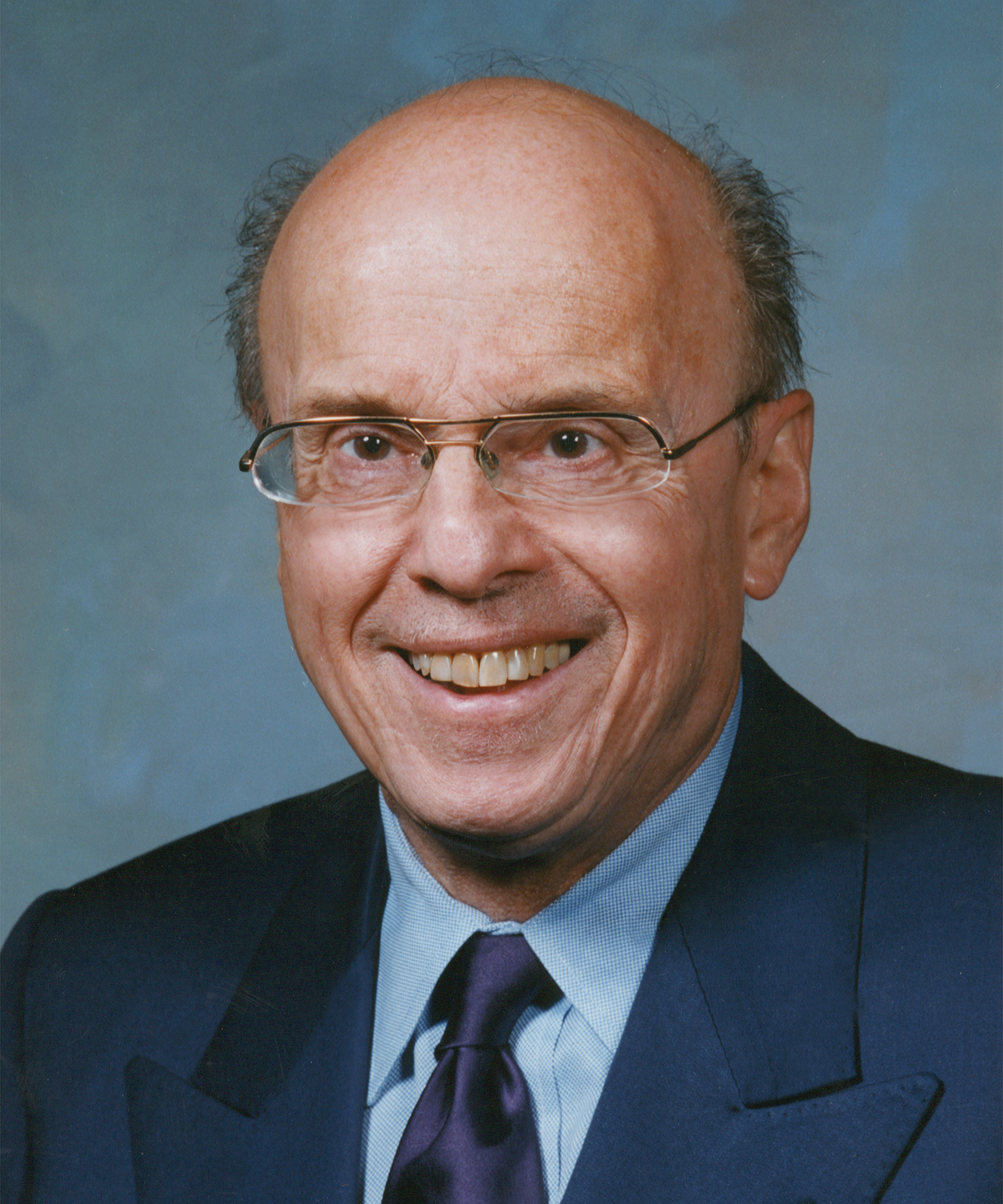
Arnold E. Aronson, Ph.D., an early and strongly supportive member of ANCDS, died on November 1, 2018, at age 90. He received his B.S., M.S., and Ph.D. degrees in Speech Pathology from the University of Wisconsin, Madison, and then became a faculty member there. In 1962, he joined the Mayo Clinic where he worked until his retirement in 1998. He was a Professor in the Mayo Medical School and served as the Head of the Section of Speech Pathology in the Department of Neurology from 1979 until 1992.
His extraordinary, internationally recognized contributions are particularly noteworthy because they influenced clinical practice across the professions of speech-language pathology, neurology and laryngology, and because they derived primarily from his work as a clinician who cared for many thousands of patients.
Arnie Aronson's clinical, research, and leadership contributions are enduringly meaningful to the patients he served, the clinicians he taught and influenced, and the profession he loved. (Continue reading)
Memorials to the American Speech-Language-Hearing Association, the MacPhail Center for Music, or the Animal Humane Society.
- Joseph R. Duffy, Ph.D.
Emeritus Consultant & Professor
Division of Speech Pathology, Department of Neurology
Mayo Clinic, Rochester, MN
Member Accomplishments
Cermak CA, Scratch SE, Reed NP, Bradley K, Quinn de Launay KL, Beal DS. Cognitive Communication Impairments in Children With Traumatic Brain Injury: A Scoping Review. J Head Trauma Rehabil. 2018 Aug 30. doi: 10.1097/HTR.0000000000000419. https://www.ncbi.nlm.nih.gov/pubmed/30169433.
Baliki, M., Babbitt, E. M., & Cherney, L. R. (2018). Brain network topology influences response to intensive comprehensive aphasia treatment. NeuroRehabilitation, 43, 63-76. DOI: 10.3233/NRE-182428.
Leora Cherney (PI). Timing of transcranial direct current stimulation (tDCS) combined with speech and language therapy (SLT): An Intervention Development study for Aphasia. Funded by the National Institute on Disability, Independent Living, and Rehabilitation (NIDILRR). 9/30/18 - 9/29/2021.
Lee, J. B., Kocherginsky, M., & Cherney, L. R. (2018). Attention in Individuals with Aphasia: Performance on the Conners' Continuous Performance Test - 2nd Edition. Neuropsychological Rehabilitation. DOI: 10.1080/09602011.2018.1460852.
Joseph R. Duffy received the ASHFoundation Frank R. Kleffner Lifetime Clinical Career Award. This award recognizes an individual's exemplary contributions to clinical science and practice over a period of 20+ years. Joe was honored for his more than 40 years of service as a clinical practitioner, researcher, and educator. His clinical practice and research have transformed accuracy for clinical diagnoses of acquired, degenerative, and functional speech and language disorders.
Galgano, J., Pantazatos, S., Allen, K., Yanagihara, T., & Hirsch, J. (2018). Functional connectivity of PAG with core limbic system and laryngeal cortico-motor structures during human phonation. Brain Research. https://doi.org/10.1016/j.brainres.2018.11.040.
Brooke Hallowell has been designated the official representative for ASHA to the Global Rehabilitation Alliance (GRA), an initiative of the World Health Organization. The mission of the GRA is to advocate for the worldwide availability of quality, coordinated and affordable rehabilitation through system strengthening according to population needs. Hallowell served as a signatory to the GRA's founding document in Geneva, Switzerland this past summer. Hallowell's appointment is for a three-year term. Hallowell invites ANCDS members who have ideas and suggestions regarding GRA initiatives to be in touch with her directly ([email protected]).
Jennifer Horner retired from Ohio University in June 2018 and was named "Associate Dean Emerita" in the College of Health Sciences and Professions, Ohio University. She is an alumna of the University of Florida (PhD, 1977) and Boston University (JD, 1998) and a founding member of the ANCDS.
Kalb R, Beier M, Benedict RH, Charvet L, Costello K, Feinstein A, Gingold J, Goverover Y, Halper J, Harris C, Kostich L, Krupp L, Lathi E, LaRocca N, Thrower B, DeLuca J. Recommendations for cognitive screening and management in multiple sclerosis care. Mult Scler. 2018 Nov 24 (13): 1665-1680. doi: 10.1177/1352458518803785.
Bayles, K., McCullough, K., and Tomoeda, C. (December, 2018). Cognitive-Communication Disorders of MCI and Dementia: Definition, Assessment, and Clinical Management. Plural Publishing. 3rd Edition.
Lindsey, A., Mozeiko, J., Krueger, F., Grafman, J., Coelho, C. (2018). Changes in discourse structure over time following traumatic brain injury. Neuropsychologia.
Lindsey, A., Hurley, E., Mozeiko, J., & Coelho, C. (2018). Follow-up on the Story Goodness Index for differentiating discourse deficits following traumatic brain injury. American Journal of Speech-Language Pathology. https://doi.org/10.1044/2018_AJSLP-17-0151.
Mozeiko, J., Coelho, C., & Myers, E. (2018). Treatment response to a double administration of Constraint Induced Language Therapy in chronic aphasia. Journal of Speech, Language, and Hearing Research, 61, 1664-1690.
Hardy, R.Y., Lindrooth, R.C., Peach, R.K., & Ellis, C. (2018). Urban-rural differences in service utilization and costs of care for racial-ethnic groups hospitalized with aphasia. Archives of Physical Medicine and Rehabilitation. doi: 10.1016/j.apmr.2018.06.033. Published online: August 10, 2018.
Whitney Postman was invited to lead the "Topics in Cultural and Linguistic Diversity" seminar moderated by Dr. Rachel M. Williams at the ASHA Convention. Her seminar was entitled, "Forging Community Partnerships To Reduce Health Disparities In African American Elders At Risk For Dementia."
Hanna J, Dumkrieger G, Berisha V, Ross K, Chong C, and Schwedt TJ. (2018, August). Sensory hypersensitivities in patients with persistent post-traumatic headache vs. migraine. Presented to the NeuroTrauma 2018 Conference, Toronto, Canada.
Chong CD, Peplinski J, Ross K, Berisha V, and Schwedt TJ. (in press). Differences in fibertract profiles between patients with migraine and those with persistent post-traumatic headache. Cephalgia.
Howard L, Dumkrieger G, Chong CD, Ross K, Berisha V, and Schwedt TJ. (2018). Symptoms of autonomic dysfunction amongst those with persistent post-traumatic headache attributed to mild traumatic brain injury: A comparison to migraine and healthy controls. Headache, 58, 1397-1407.
Chong CD, Berisha V, Ross K, Chiang C-C, and Schwedt TJ. (2018). Less cortical thickness in patients with persistent post-traumatic headache compared to healthy controls: an MRI study. Headache: The Journal of Head and Face Pain, 58, 53-61.
Lee, J. B., Sohlberg, M. M., Harn, B., Horner, R. & Cherney, L.R. (2018). Attention Process Training-3 to improve reading comprehension in mild aphasia: A single-case experimental design study. Neuropsychological Rehabilitation. DOI: 10.1080/09602011.2018.1477683.
Edythe Strand published a new test "Dynamic Evaluation of Motor Speech Skill (DEMSS)" by Brookes Publishing. DEMSS is a criterion-referenced assessment designed to help with differential diagnosis of speech sound disorders in children with severely impaired speech production.
Megan Sutton has two new video CEU courses available through MedBridge Education: "Integrating Apps into Aphasia Therapy" and "Communicate and Connect: Using Technology with Aphasia."
Rene Utianski has been appointed Senior Associate Consultant, in the Division of Speech Pathology, Department of Neurology, at the Mayo Clinic in Rochester, Minnesota, as of October 17, 2018.
Utianski, R.L., Caviness, J.N., Worrell, G.A., Duffy, J.R., Clark, H.M., Machulda, M.M., Whitwell, J.L., and Josephs, K.A. (2018). Electroencephalography in Primary Progressive Aphasia and Apraxia of Speech. Aphasiology. DOI: 10.1080/02687038.2018.1545991.
Utianski, R.L., Duffy, J.R., Clark, H.M., Strand, E.A., Boland, S.M., Machulda, M.M., Whitwell, J.L., and Josephs, K.A. (2018). Clinical Progression of Four Cases of Primary Progressive Apraxia of Speech. American Journal of Speech-Language Pathology, 27, 1303-1318. DOI: 10.1044/2018_AJSLP-17-0227.
Tetzloff, K.A., Whitwell, J.L., Utianski, R.L., Duffy, J.R., and Josephs, K.A. (2018). Quantitative assessment of grammar in amyloid-negative logopenic aphasia. Brain and Language, 186, 26-31. DOI: 10.1016/j.bandl.2018.09.003.
Tetzloff, K.A., Utianski, R.L., Duffy, J.R., Clark, H.M., Strand, E.A., Josephs, K.A., and Whitwell, J.L. (2018). Quantitative analysis of agrammatism in agrammatic Primary Progressive Aphasia and Dominant Apraxia of Speech. Journal of Speech, Language, and Hearing Research, 61(9), 2337-2346. DOI:10.1044/2018_JSLHR-L-17-0474.
Utianski, R.L., Whitwell, J.L., Schwarz, C.G., Duffy, J.R., Botha, H., Clark, H.M., Machulda, M.M., Senjem, M.L., Knopman, D.S., Petersen, R.C., Jack, C.R., Lowe, V.J., and Josephs, K.A. (2018). Tau Uptake in Agrammatic Primary Progressive Aphasia with and without Apraxia of Speech. European Journal of Neurology, 25(11), 1352-1357. DOI: 10.1111/ene.13733.
Utianski, R.L., Duffy, J.R., Clark, H.M., Strand, E.A., Botha, H., Schwarz, C.G., Machulda, M.M., Senjem, M., Spychalla, A.J., Jack, C.R., Petersen, R.C., Lowe, V.J., Whitwell, J.L., and Josephs, K.A. (2018). Prosodic and Phonetic Subtypes of Primary Progressive Apraxia of Speech. Brain and Language, 184, 54-65. DOI: 10.1016/j.bandl.2018.06.004.
Kathryn Yorkston received the Alfred K. Kawana Award for Lifetime Achievement in Publications at the ASHA Convention.
|